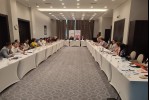Project Overview
The Roma Integration 2020 project, implemented by the Regional Cooperation Council (RCC) with the financial support of the European Union and the Open Society Foundations, aims to contribute to reducing the socio-economic gap between the Roma and non-Roma population in the Western Balkans and Turkey and to strengthen the institutional obligations of governments to incorporate and deliver specific Roma integration goals in mainstream policy developments.
Roma continuously face social exclusion, discrimination, segregation and marginalization. While the Decade of Roma Inclusion 2005-2015 and the EU accession process established baseline policy processes, institutional arrangements and dialogue on Roma issues, impact remains limited. Reason is found in the isolation of the issues of Roma from mainstream public policies, budgeting, services and administration, which is the challenge Roma Integration 2020 project is designed to tackle. Building on the lessons learned in the first phase of the action, the second phase enhance the work to equip governments to deliver equal quality public services to Roma and ensure that targeted and mainstream public investments reach Roma communities.
The action strives to support tangible results for Roma by assisting
the enlargement region governments to define and implement specific targets in
education, employment, housing and health. These targets are also enclosed in the Declaration of Western Balkans Partners on
Roma Integration within the EU Enlargement Process that was endorsed at a
high level ministerial event held in Poznan in July 2019.
In addition to working with the governments and central
institutions to improve their delivery on Roma integration, the action supports
dialogue on Roma integration among local institutions, civil society, and
relevant international organizations.
Roma Integration 2020 beneficiaries are Albania, Bosnia and
Herzegovina, Republic of North Macedonia, Kosovo*, Montenegro, Serbia, and Turkey.












